Mt. Vernon High School in Illinois has a long tradition of basketball successes, but one story in particular about a gifted high school basketball player stands out, the tale of the Mt. Vernon player who never played varsity basketball. But first, some context.
At the beginning of the 1960s, during the one-class system era, the Mt. Vernon Rams held the record for most state titles, and as a youth, I had the privilege of learning all about the team’s illustrious history. These lessons most often occurred on the Saturdays, especially in the winter months, when I went with my dad to his car salesman job in Mt. Vernon.

We would go across the alley from Dad’s work to a little sandwich shop at the Greyhound Bus station. There, I drank chocolate milk from a small waxy carton, using the drink to help me get down a roast beef sandwich that was so dry each bite was like swallowing sawdust. The time was made bearable, however, by the enthusiastic talk about the Mt. Vernon Rams basketball team between Dad and other sports fans, one of them a local basketball official. To this day, I can still recite, like a mantra, the names of some of the great Rams players of the 1950s and early 1960s—Max Hooper, Goff Thompson, Albert Avant, Colman Carrodine—to list a few.
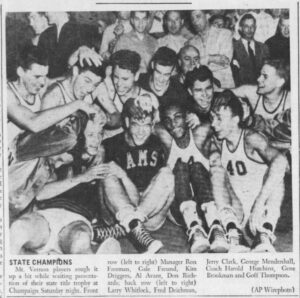
But there was sometimes a darker side to the sports talk at the crowded, noisy bus station, sly comments about more than a few good players in the system who never made varsity, talk of inside cliques, family pull, and coach’s favorites. One thing was for certain, being chosen to be a part of one of the Mt. Vernon basketball teams, let alone being one of the starting five, was a great and very sought-after honor. Making the team, however, was a rare event for so many want-to-be Ram basketball stars, even for those with strong skills.
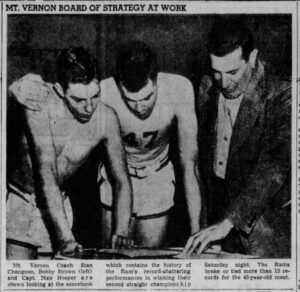
Fortunately, the city and Jefferson County had another outlet that allowed thousands of youths to live out their dream of playing organized basketball, one that also offered a high level of community recognition—the Church League Basketball Association.
Church league basketball has been around for decades, but the league which developed in Mt. Vernon, Illinois, reached an especially high level of participation and basketball playing sophistication. A detailed article in the early 1970s in the Mt. Vernon Register News noted that the church league program there was started in 1929 with six teams, with the teams playing their games in a garage in town. The first churches involved were Central Church of Christ, Wesley Methodist, Logan Street Baptist, First Baptist, First United Methodist, and First Presbyterian. The league really took off in 1945, however, jumping in numbers of participating churches over the years of from six to eight to twelve to sixteen, and, finally, to twenty-one congregations by the early 1970s.
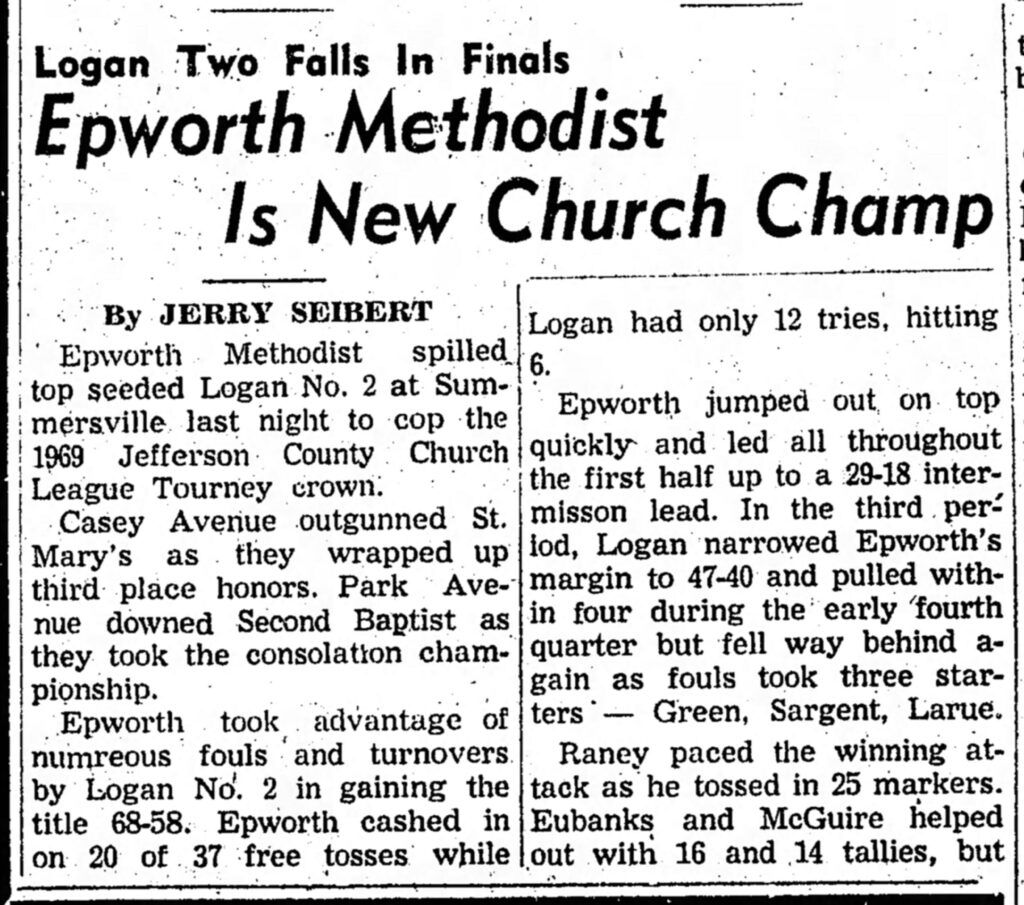
A member of a team was expected to attend some church services, but little or no pressure to convert occurred, local churches just being happy in keeping teenage boys active and out of trouble. By the early 1970s, according to one newspaper account, “over 4,000 boys have played organized basketball and benefited from this program.”
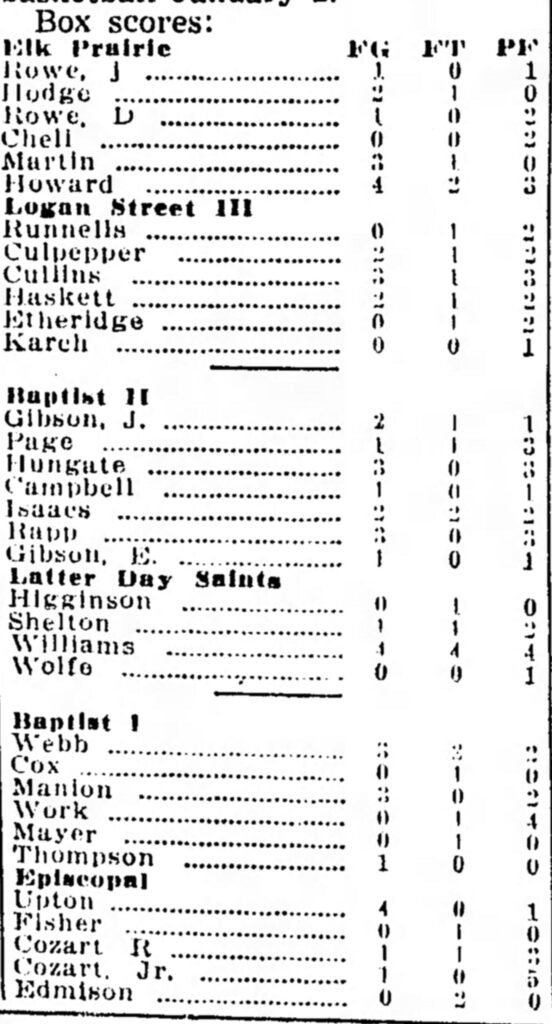
What was most outstanding and important about the program to the players involved the weekly recognition the teams and players received in the Mt. Vernon Register News. Detailed weekly stories on the main sports page, along with complete box scores were posted, just like the high school games. The year-end championship tournament play received even more special recognition. Several high school students over the years, including George Moore and Jerry Siebert in the 1960s, penned these informative columns for the Register News.
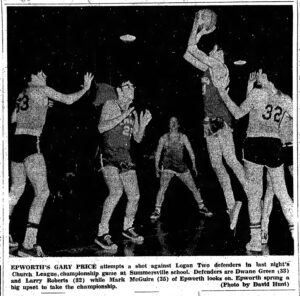
The level of play was typically heated and solid, and the performance of some of the players over the years in the league was highly exceptional. A Rams’ varsity player from the early 1960s, who had several friends who played in the church league, recalled that after one particularly good season was over, the church league crowd daydreamed of putting an all-star team together and playing the Rams’ high school squad. “Many of them thought it would be a close game.” In that respect, perhaps the most intriguing aspect of the Mt. Vernon Church League concerned some of the better players in the 1960s. Mt. Vernon Register News sportswriter Bob Forbes wrote a long article in the sports page in 1970 about this aspect, noting,
Some of Mt. Vernon’s best high school and college athletes got their start in the church league. To name a few: Danny Hester, [a senior in 1966] a former Ram great, started at the Church League and was picked up by Mt. Vernon High. He went on to star at Louisiana State University and is now a member of the ABA Denver Rockets. Terry Sledge played one year of Church League basketball and was then spotted by Ram coaches who persuaded him to play high school basketball. Sledge was a starter for two years on Ram varsity teams and climaxed his prep career by playing a key role in the state tournament team in 1968-1969 season.
There were others. In the 1965-1966 season, a desperate Mt. Vernon Rams coach grabbed the church league’s leading scorer, David Campbell, to start varsity, “the Ram refugee from the church league,” as one southern Illinois newspaper christened him. The Register News, writing of another game, noted, “David Campbell, a 6-2 senior recruited from the ranks of Mt. Vernon church league basketball this year, almost beat the Benton Rangers with his brilliant outside shooting to produce 18 points.”

Mike McClure, another great church league player, “never played high school basketball, but he played four years in the church league.” McClure, Forbes went on to point out, would later become a high school basketball coach where he was able to be a positive influence for many young men.
The most interesting and most successful of the church league players Forbes discussed also never played high school varsity basketball, and the Rams’ coaches likely fretted for some time about the “one who got away.” The player’s name was Lee Yearwood, and he would become something of a sports legend.
Yearwood was an all-around athlete when he left Mt. Vernon’s Casey Junior High and entered Mt. Vernon high school in the fall of 1956. In junior high, he had been a baseball stand out in the Optimist League and had helped Casey Junior High take the southern Illinois track meet championship as a sprinter. He was also a member of the junior high basketball team, although his lack of height relegated him to a sixth man position on a strong Casey team.
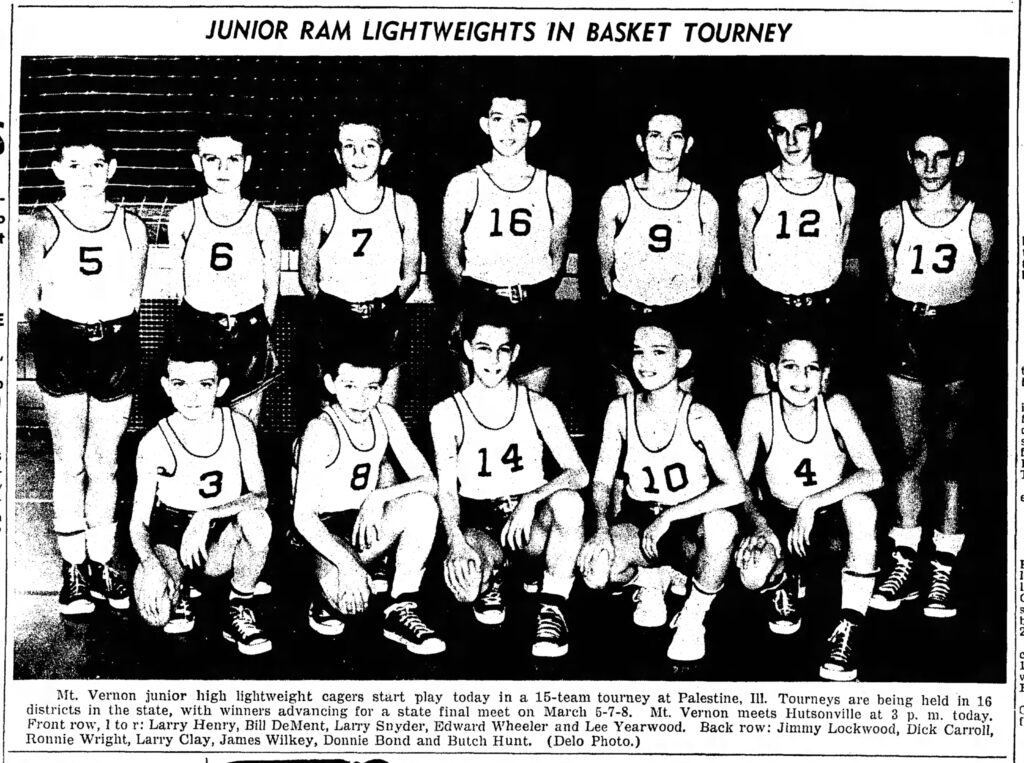
High school football and track came easy for Lee. At a sturdy five-nine, he was the Ram’s starting fullback for three years, scoring the winning touchdown his senior year in the season’s last game against a strong Salem, Illinois, team. The touchdown came on a muddy field on the last play of the game. In track, he ran on a relay team his senior year which placed third at the state finals and whose time still stands as the school record today. For this later accomplishment, Lee would be inducted into the Mt. Vernon High School sports hall of fame.
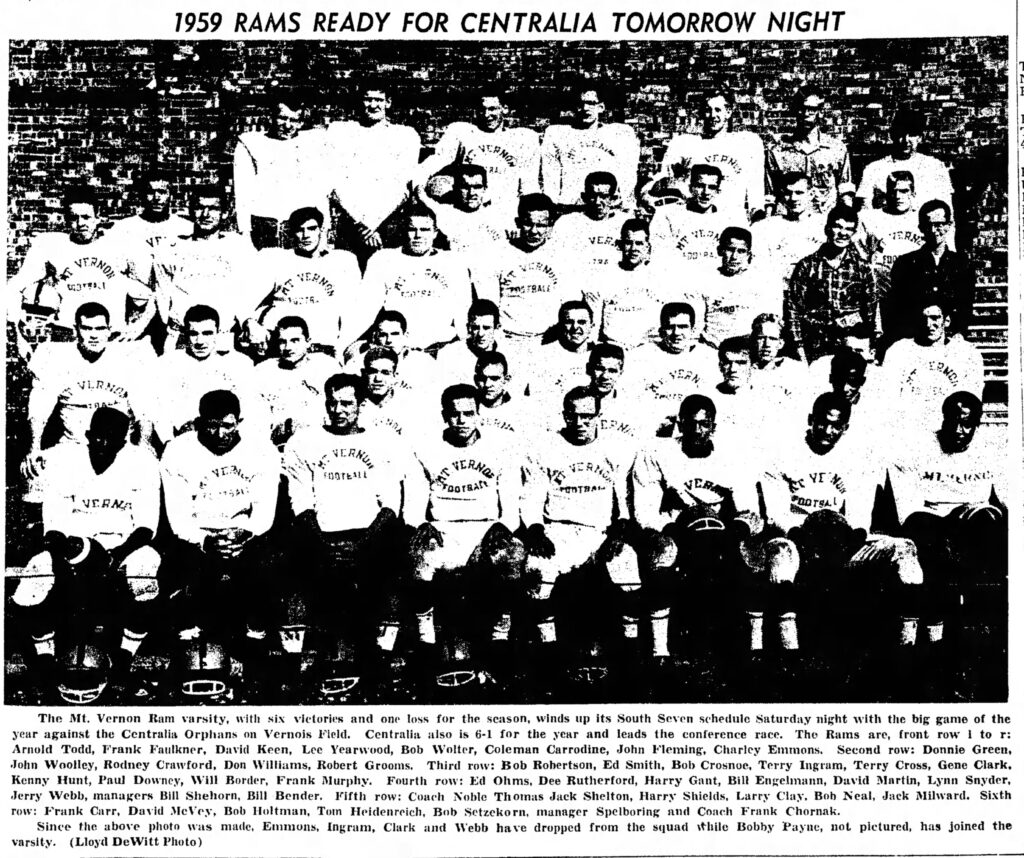
Basketball was a different matter. For all his burliness, Lee was lighting fast and could shoot as well as any of the other players he went up against when he tried out for the Rams varsity. But at five-nine, some of the coaches deemed him too short to get much time at varsity play.
Yearwood saw the writing on the wall, opting instead to play basketball in the Mt. Vernon Church league starting his junior year. In his senior year, he set the record for most points in a single game, and his team went undefeated in the league that year. Regarding the former, the Register News, in a detailed article, noted that “Lee Yearwood staged the greatest demonstration in the history of Mt. Vernon Church League last night at Bethel [grade school]. Yearwood made 38 field goals and nine free throws for a total of 85 points in a game.”
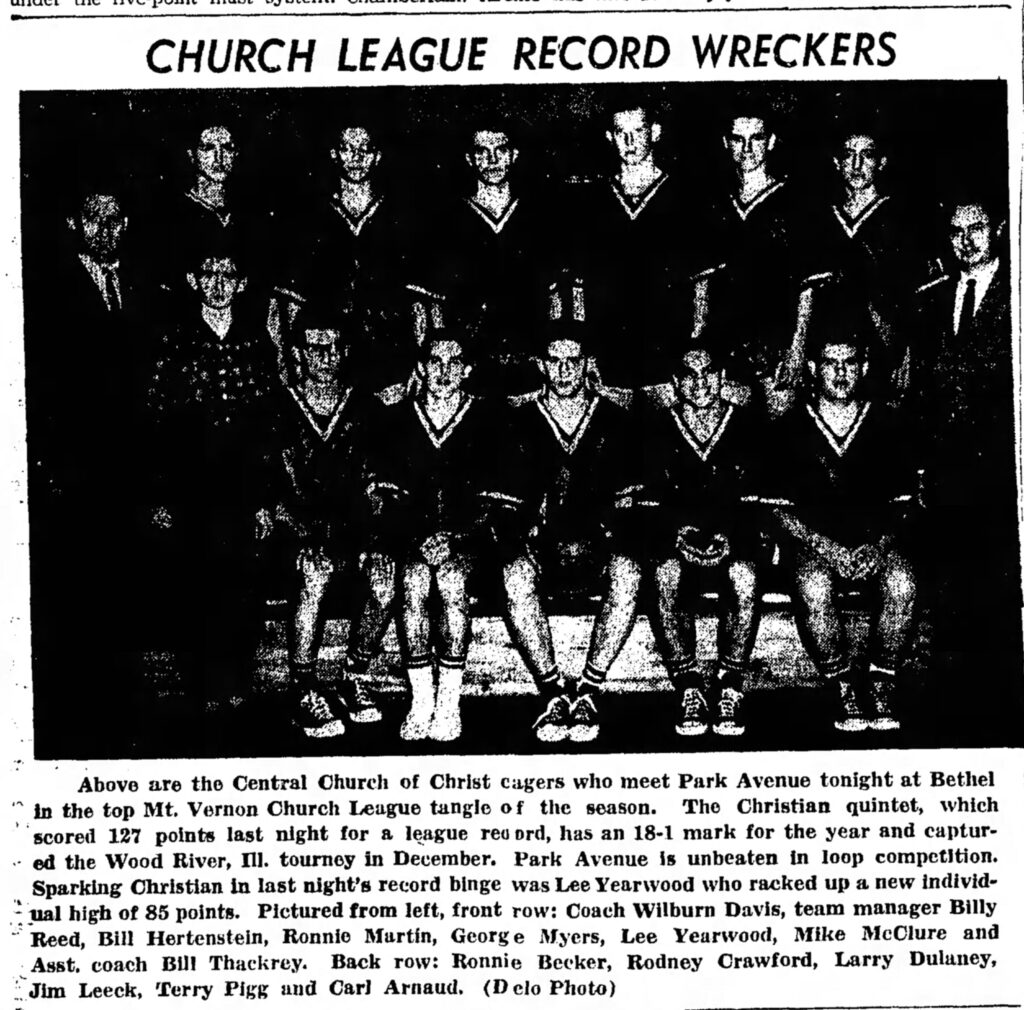
After high school, Lee Yearwood enrolled at Mt. Vernon Community College, where he continued to set basketball records. The local newspaper reported in one game that “Lee Yearwood, 5’10” scoring guard of the Warriors, hit for the first ten points for Mt. Vernon. Yearwood ended the night with a tremendous .515 shooting percentage and 35 points. Most of the shots were long jumpers.” In another game, Lee scored forty-three points, hardly missing a shot, and racking up all his points but one on field goals.
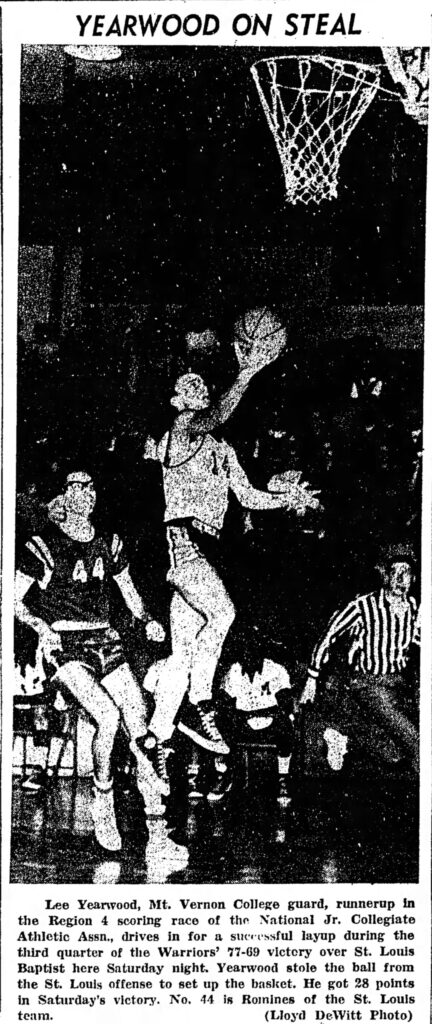
After two years playing at the community college, Lee held the school’s all-time scoring record, was the leading scorer in the conference his last year, made the conference first team squad, and received honorable mention for All-American honors. He was also selected as most valuable player on the Warrior team. The Mt. Vernon Register News headlined a picture of Yearwood on the front sports page with the headline: Warrior Record-Wrecker and included a detailed narrative on all his accomplishments. But his career was not yet over.
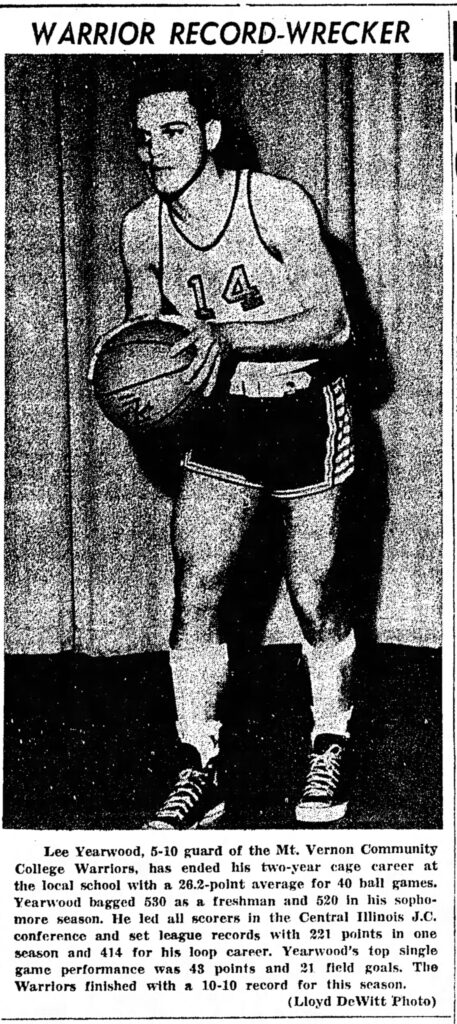
Baylor University in Texas took great notice of Yearwood’s community college accomplishments and gave him a scholarship to play basketball. At Baylor, Lee continued to blossom, playing two years of varsity basketball as the team’s floor leader, and leading the Bears to a victory over the University of Texas in the rugged Southwest Conference. It was here that Yearwood was proudly touted as the “church league basketball player from Mt. Vernon, Illinois.”
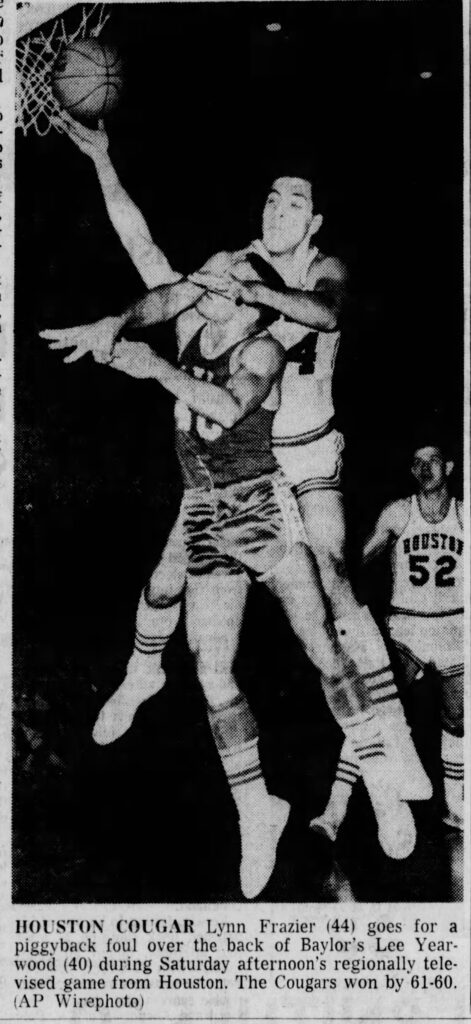
In 1964, the fall after Lee Yearwood graduated from Baylor, the Mt. Vernon Register News carried as story about the many successes of the city’s church league. Using Lee Yearwood’s story as the best example, the account ended by asking, “Would all this have happened without the opportunity and encouragement Lee received through church league basketball? How many more stories have been untold?”
Sadly, like so many other once functional aspects of small-town communities, the Mt. Vernon Church Basketball League has faded away. Yet, echoes of the league’s good work still reverberate today, echoes, however, that slowly diminish with the passage of time, leaving only the question of whether an all-star church league team, led by the likes of Lee Yearwood, could have handled the varsity Mt. Vernon Rams.